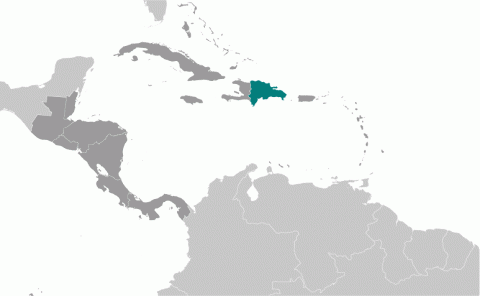Child Labor and Forced Labor Reports
Dominican Republic


Minimal Advancement – Efforts Made but Continued Practice that Delayed Advancement
In 2024, the Dominican Republic made minimal advancement in efforts to eliminate the worst forms of child labor. The government passed Law 63-24, which increased penalties for child trafficking and removed the need to establish force, fraud, or coercion in crimes of child trafficking. The government also distributed uniforms and school materials to more than 1.8 million students and added 400 additional school buses. Beginning with the 2024/2025 school year, parents and legal guardians were no longer required to present a physical birth certificate to enroll their children in schools, as it could be done electronically. While this removes an administrative barrier to education, it is unclear how this will benefit children without identification. The Dominican Republic is assessed as having made only minimal advancement due to findings that children without identification documents are denied social services, including access to the government’s poverty reduction and vocational training programs. Children without this documentation are unable to receive secondary school certification, discouraging them from continuing their education and increasing the likelihood of entering the workforce. In addition, the government has an insufficient amount of labor inspectors and did not conduct targeted inspections in areas prone to high levels of child labor.
| Children | Age | Percent and Population |
|---|---|---|
| Working | 5 to 14 | 6.3% (Unavailable) |
| Hazardous Work by Children | 15 to 17 | Unavailable |
| Attending School | 5 to 14 | 96.4% |
| Combining Work and School | 7 to 14 | 9.2% |
| Sector/Industry | Activity |
|---|---|
| Agriculture | Working in agriculture, including in the production of coffee, rice, and tomatoes. Farming.† |
| Industry | Producing baked goods. Mining.† Construction.† |
| Services | Domestic work.† Street work, including vending,† begging,† washing cars,† shining shoes,† and transporting packages in markets. Scavenging in landfills. Working in woodworking shops, car washes, auto repair shops,† blacksmith workshops, and in convenience store deliveries.† |
| Categorical Worst Forms of Child Labor‡ | Forced labor in domestic work, construction, street vending, begging, and agriculture. Commercial sexual exploitation, sometimes as a result of human trafficking. Use in illicit activities, including drug trafficking, sometimes as a result of human trafficking. |
† Determined by national law or regulation as hazardous and, as such, relevant to Article 3(d) of ILO C. 182.
‡ Child labor is understood as the worst forms of child labor per se under Article 3(a)–(c) of ILO C. 182.
Children at Higher Risk
Children from Haiti who are residing in the Dominican Republic are vulnerable to labor exploitation because they lack birth residency documents. These children may be denied access to education or engage in child labor, including its worst forms, in part because labor inspectors may not be able to verify their ages. In addition, many Dominican-born persons of Haitian descent, including children, lack identity documents because of a Constitutional Court decision in 2013 that retroactively revoked birthright citizenship of all persons born after 1929 to non-citizens in the Dominican Republic. Children in tourist locations are particularly vulnerable to commercial sexual exploitation, especially in major urban and coastal resort areas.
Barriers to Education Access
According to Dominican law, education should be free and compulsory until age 14 and accessible to all children. However, children without identity documents face challenges in continuing their education past the eighth grade because they lack the required identification documents. These children are not able to receive a high school diploma, leaving them without the means to prove that they completed high school. Moreover, despite a July 2023 Ministry of Education directive to public schools noting that all children must be allowed to attend school regardless of their identity documentation, the Ministry of Education Operations Manual of Public Education Centers incorrectly instructs school administrators to request identity documents for school enrollment. School infrastructure, costs, and teacher availability are also commonly cited barriers for children to attend school, especially in rural areas to attend school.
| Standard | Age | Meets International Standards | Legislation |
|---|---|---|---|
| Minimum Age for Work | 16 | ✓ | Article 245–247 and 249–253 of the Labor Code; Article 40 of the Code for the Protection System and Fundamental Rights of Boys, Girls, and Adolescents; Article 56.1 of the Constitution |
| Minimum Age for Hazardous Work | 18 | ✓ | Sections 1 and 3 of the Resolution Modifying the List of Hazardous Work for Persons Under Age 18; Articles 251, 720, and 721 of the Labor Code |
| Identification of Hazardous Occupations or Activities Prohibited for Children | ✓ | Section 3 of the Resolution Modifying the List of Hazardous Work for Persons Under Age 18; Articles 246, 249, 252, and 253 of the Labor Code | |
| Prohibition of Slavery, Debt Bondage, and Forced Labor | ✓ | Articles 1, 3, and 7 of the Law Against Migrant Smuggling and Trafficking in Persons; Articles 25 and 409 of the Code for the Protection System and Fundamental Rights of Boys, Girls, and Adolescents; Articles 40, 41, and 62.2 of the Constitution | |
| Prohibition of Child Trafficking | ✓ | Articles 1, 3, and 7 of the Law Against Migrant Smuggling and Trafficking in Persons; Articles 25, 406, and 409–411 of the Code for the Protection System and Fundamental Rights of Boys, Girls, and Adolescents; Article 41 of the Constitution; Article 3 of Law 63-24 | |
| Prohibition of Commercial Sexual Exploitation of Children | ✓ | Articles 25 and 408–411 of the Code for the Protection System and Fundamental Rights of Boys, Girls, and Adolescents; Articles 1, 3, and 7 of the Law Against Migrant Smuggling and Trafficking in Persons; Article 24 of the Law on Technological Crime; Article 56.1 of the Constitution | |
| Prohibition of Using Children in Illicit Activities | ✓ | Article 85 of the Law on Drugs and Controlled Substances | |
| Minimum Age for Voluntary State Military Recruitment | 18 | ✓* | Articles 26, 29, 96, and 97 of the Organic Armed Forces Law |
| Prohibition of Compulsory Recruitment of Children by (State) Military | ✓* | Articles 4, 96, 97, 231, and 232 of the Organic Armed Forces Law | |
| Prohibition of Military Recruitment by Non-state Armed Groups | ✗ | ||
| Compulsory Education Age | 14‡ | ✓ | Article 63 of the Constitution; Articles 33, 35, 37, and 40 of the Organic Law of Education |
| Free Public Education | ✓ | Article 63 of the Constitution; Articles 33, 35, 37, and 40 of the Organic Law of Education; Ministry of Education Circular No. 18 of 2011; Articles 45 and 46 of the Code for the Protection System and Fundamental Rights of Boys, Girls, and Adolescents |
* Country has no conscription
‡ Age calculated based on available information
In October 2024, the Dominican Republic passed Law 63-24 which, among other things, eliminates the need to prove deception, force, or coercion for trafficking crimes involving minors. The law also removes consent as a possible defense against trafficking and increases penalties for trafficking cases involving minors and people with disabilities.
| Organization/Agency | Role & Activities |
|---|
| Ministry of Labor: Leads efforts to prevent and eliminate child labor, supervises compliance with labor regulations, conducts labor inspections, and oversees the Directorate of Policies for the Prevention and Eradication of Child Labor. Refers children found in exploitative conditions to the National Council for Children and Adolescents for social services. However, the labor inspectorate lacks sufficient financial and human resources to carry out adequate inspections and inspectors do not have authority to assess labor penalties, instead writing infraction reports that are sent to prosecutors in the Office of the Attorney General for enforcement action. In 2024, the Ministry of Labor held 3 workshops for its 40 local labor representatives, which focused on protocols to prevent and address the worst forms of child labor, including identification and management of child labor cases, application of national and international regulations in this area, and monitoring techniques and improvement of institutional response. |
| Office of the Attorney General (AG): Prosecutes crimes involving children, including criminal violations related to the commercial sexual exploitation of children and other worst forms of child labor. Oversees the Special Prosecutor for Migrant Smuggling and Human Trafficking, which receives notifications of alleged violations related to the worst forms of child labor through a hotline. Reports indicate that some cases referred to the AG by the Ministry of Labor are not investigated and prosecuted by the AG due to a lack of coordination between these two entities. In 2024, Regional Attorney General’s Offices for Children and Adolescents participated in 33 workshops to prevent child labor, commercial sexual exploitation of children, and child abuse. |
| Overview of Enforcement Efforts | 2024 |
|---|---|
| Has a Labor Inspectorate | Yes |
| Able to Assess Civil Penalties | Yes |
| Routinely Conducted Worksite Inspections | Yes |
| Unannounced Inspections Permitted | Yes |
| Has a Complaint Mechanism | Yes |
| Imposed Penalties for Child Labor Violations | Yes |
| Conducted Criminal Investigations for Worst Forms of Child Labor Crimes | Yes |
| Imposed Penalties for Worst Forms of Child Labor Crimes | Yes |
In 2024, 209 labor inspectors conducted 38,698 worksite inspections, finding 302 child labor violations. The government conducted 6 investigations into suspected cases of the worst forms of child labor, initiated 1 prosecution, and convicted 2 perpetrators.
| Coordinating Body | Role & Activities |
|---|
| National Steering Committee to Eliminate Child Labor (CDN): Develops policies, approves programs, and coordinates, monitors, and evaluates efforts to address child labor in the Dominican Republic. Meets every 2 months, overseen by the Ministry of Labor, and comprises ministerial representatives, labor unions, private sector representatives, NGOs, more than 30 other institutions, and local steering committees from each province. Oversees the system for referring children found during inspections to appropriate social services. In 2024, the CDN met five times. As of November 30, 2024, local steering committees held 77 meetings with 937 participants, while municipal monitoring committees, or “cells,” convened 86 times with 1,005 participants. |
| Policy | Description & Activities |
|---|
| Roadmap Toward the Elimination of Child Labor and Its Worst Forms in the Dominican Republic (2010–2025): Serves as the national strategic framework to achieve the goals established in the Hemispheric Agenda on Decent Work related to child labor. Aims to prevent and eliminate child labor and its worst forms, and sets targets and indicators for poverty reduction, health, education, institutional coordination, awareness raising, and information sharing. |
| National Development Strategy (2010–2030): Aims to reduce poverty and inequality, and includes programs to address child labor, provide universal education to all children, and expand access to secondary school, including for students without identity documents. In 2024, for the 12th consecutive year, the government committed to allocating 4 percent of the nation’s gross domestic product to primary and secondary education as indicated by the National Development Strategy. The purpose of this continued funding is to improve the national education system. |
| Education Pact (2014–2030): Includes strategies to address child labor and seeks to improve the quality of, and access to, primary and secondary education by increasing attendance and graduation rates and enrolling more students in the Extended School Day Program. Implemented by the Ministry of Education and supported by the World Bank. |
† The government had other policies that may have addressed child labor issues or had an impact on child labor.
| Program | Description & Activities |
|---|
| SUPERATE:‡ Aims to reduce poverty by providing low-income families with social protection interventions, including conditional cash transfers, socio-educational support, educational inclusion, housing, food security, and referrals to other government programs and services. One of the goals of this program is to increase children’s school attendance and reduce child labor. Nonetheless, research indicates that SUPERATE is not available to families who are without documentation. In 2024, SUPERATE provided 20,812 families with a stipend to assist children with disabilities. |
| Opportunity 14-24 (Oportunidad 14-24):‡ Supports high-risk and socially vulnerable adolescents and young people between ages 14 and 24 who have limited resources by providing access to technical professional training, scholarships, a monthly provision of raw food, and transportation to study centers. However, research indicates that individuals without documentation are ineligible to participate in the program. In 2024, more than 1,300 youth graduated from the Opportunity 14-24 program. |
| Extended School Day Program (Jornada Escolar Extendida):‡ Ministry of Education program to extend school hours to a full day (8 a.m. to 4 p.m.) to improve educational achievement and reduce child labor. In 2024, the implementation of the Extended School Day Program resulted in minimal positive impacts on students’ exam results. |
‡ Program is funded by the Government of the Dominican Republic.
† The government had other social programs that may have included the goal of eliminating or preventing child labor.
| Area | Suggested Action |
|---|---|
| Legal Framework | Ensure that the law criminally prohibits the recruitment of children under 18 by non-state armed groups. |
| Enforcement | Increase the number of labor inspectors from 209 to 341 to provide adequate coverage of the labor force of approximately 5.1 million people, especially in remote rural area, and provide additional training to labor enforcement officials on child labor issues, including case documentation, re-inspection protocols, indicators of human trafficking, and standard operating procedures on referral of trafficking survivors to services. |
| Strengthen the labor inspectorate’s ability to conduct inspections, including by initiating targeted inspections based on analysis of data related to risk-prone sectors and patterns of serious incidents, ensuring that the number of inspections conducted by each inspector is appropriate so as not to diminish the quality and scope of inspections, improving case tracking so that labor inspectors are able to promptly follow up on violations and refer children to remediation services, and ensuring that labor inspectors interview workers in a safe environment and are able to communicate with Creole-speaking workers. | |
| Ensure that cases of the worst forms of child labor are adequately investigated, sanctioned, and prosecuted, including by investigating, prosecuting and punishing cases of trafficking and sexual exploitation of children in the context of tourism, improving coordination between criminal enforcement officials and tourism industry stakeholders, and improving coordination between the Ministry of Labor and the Office of the Attorney General. | |
| Establish a system to verify the age of young workers to better protect children without birth certificates or other legal documentation from exploitation. | |
| Increase human and financial resources to criminal law enforcement agencies and provide additional training on child labor issues, including how to use inspection data to enable prosecution, indicators of human trafficking, and standard operating procedures on referral of trafficking survivors to services. | |
| Publish information on the number of child labor penalties imposed that were collected and the number and nature of violations concerning young persons in hazardous work. | |
| Government Policies | Take steps to implement the Roadmap Toward the Elimination of Child Labor and Its Worst Forms in the Dominican Republic, the National Development Strategy, and Education Pact and publish information about implementation efforts on an annual basis. |
| Social Programs | Collect and publish data on the extent and nature of child labor to inform policies and programs. |
| Increase efforts to issue identification documents to all children and ensure that children without documentation can access social programs as provided by Dominican law. | |
| Increase school infrastructure and teacher availability, especially in rural areas, remove supply- and school-related fees, and expand efforts to reduce discrimination on the basis of national origin in schools. | |
| Ensure that children are not denied access to education and update all Ministry of Education school manuals to align with Dominican law guaranteeing that children without birth certificates or identity documents are able to enroll in schools and receive diplomas certifying school completion. | |
| Expand social protection programs and specialized services for trafficking survivors as applicable, particularly for child survivors of commercial sexual exploitation, agricultural labor exploitation, and forced labor, and ensure that programs also provide services to vulnerable children who are without identity documents. | |
| Ensure that the National Council for Children and Adolescents has sufficient resources and facilities to provide the necessary care for survivors of child labor and child trafficking. |














